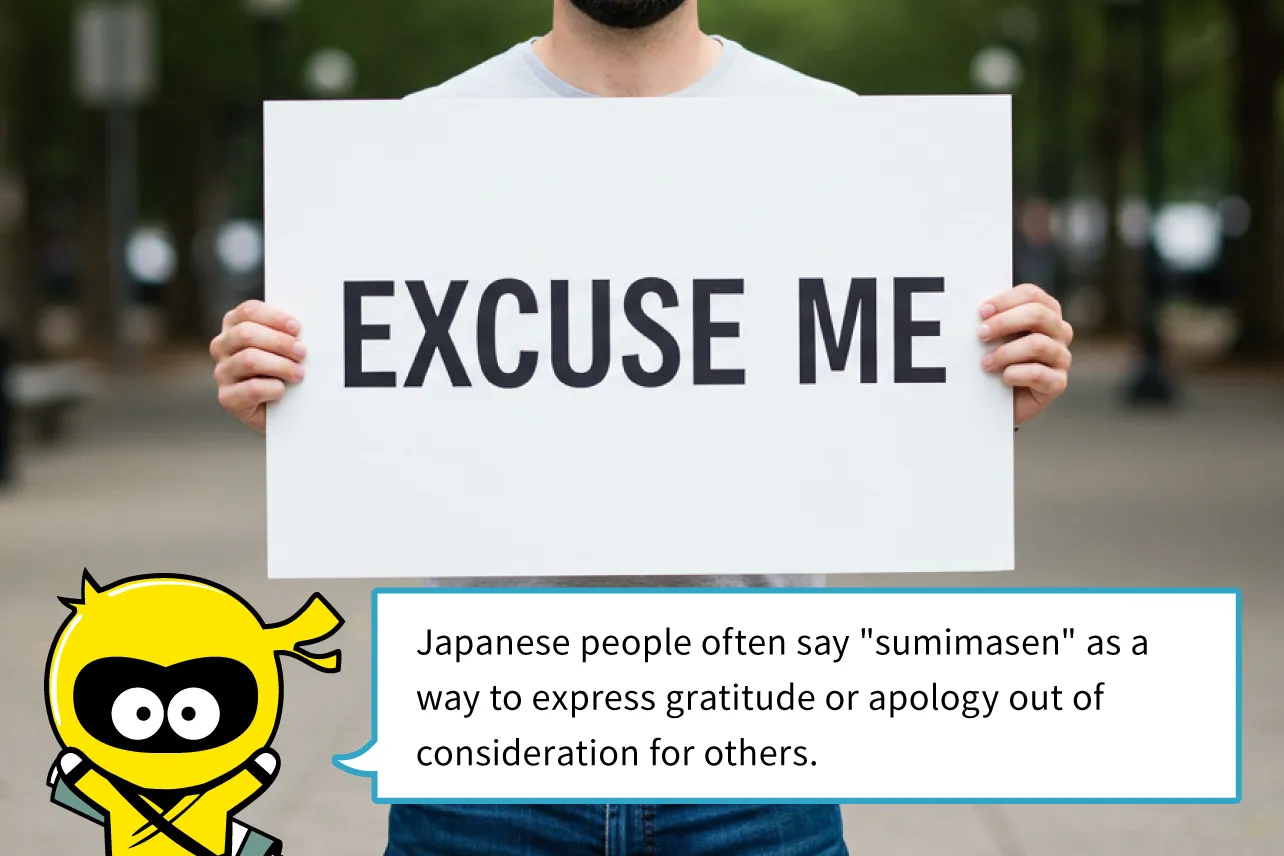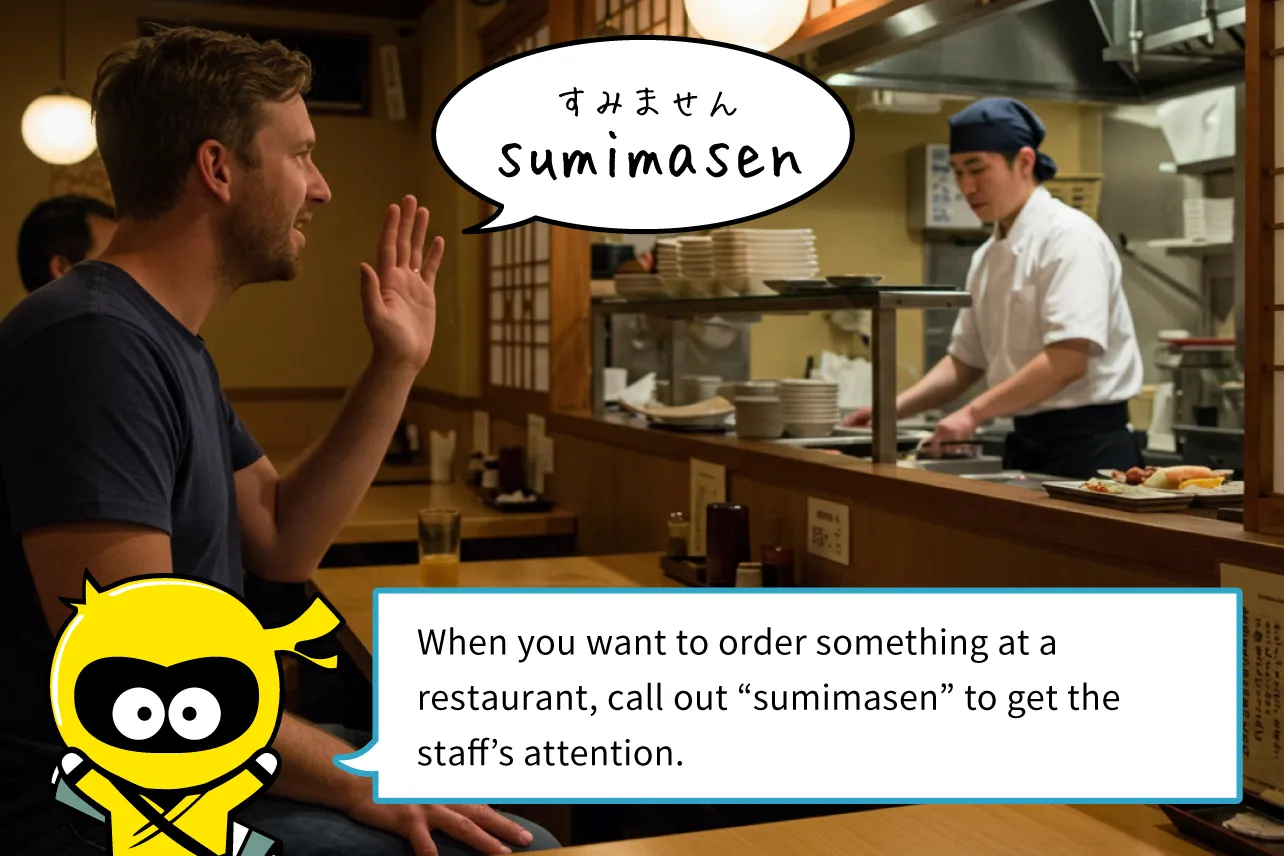

Not Just an Apology? The Basic Meaning of “Sumimasen”
In Japanese, “sumimasen” is more than just an apology. It’s used not only when saying sorry, but also when getting someone’s attention, expressing gratitude, or even showing politeness. This versatile word reflects a uniquely Japanese sense of humility and consideration for others. For visitors to Japan, learning “sumimasen” is essential. Understanding its nuances will help you feel more confident when asking for directions or placing an order at a restaurant.
5 Common Situations Where Japanese People Say “Sumimasen”


Japanese people use “sumimasen” remarkably often. Here are some typical situations:
- Apologizing after bumping into someone
- Calling a store clerk
- Asking for directions
- Expressing gratitude after receiving help
- When taking up someone’s time, etc.
The meaning of “sumimasen” changes subtly depending on the context. It’s a word that often carries emotional or situational nuances, requiring listeners to read between the lines. In conversation, it’s an expression of politeness, thoughtfulness, and social etiquette.
What’s the Difference Between “Sumimasen” and “Gomen nasai”?
Both are used to apologize, but there’s a difference in tone. “Gomen nasai” feels more casual and personal, often used among family, friends, or children. “Sumimasen,” on the other hand, is more polite and appropriate for public or formal situations. Understanding the difference helps visitors to Japan speak more naturally, depending on the relationship and setting.
Why Do Japanese People Say “Sumimasen” Instead of Thank You?
Sometimes, when someone does something kind, Japanese people say “sumimasen” instead of “arigatou.” This reflects a feeling of not wanting to cause trouble or inconvenience. In essence, it combines gratitude with humility and consideration. Even when “thank you” would be sufficient in English, “sumimasen” may feel more appropriate in Japanese. Knowing this cultural nuance can make conversations smoother for visitors.
Using “Sumimasen” in Shops and Restaurants


In Japan, it’s common to call out “sumimasen” to get the attention of staff at restaurants or stores. Raising your hand and saying “sumimasen!” will usually prompt quick service. This is similar to saying “Excuse me” in English, but in Japan, snapping fingers or clapping is considered rude. “Sumimasen” is also used to say thank you or to apologize for a mistake with an order, making it a highly useful and respectful phrase.
Why Say “Sumimasen” on Trains or Crowded Streets?
In crowded places like trains, Japanese people often say “sumimasen” even for minor contact. It shows consideration and a willingness to take responsibility, even for small incidents. It’s also used to preface a question, such as when asking for directions. In this way, “sumimasen” acts as a social lubricant, helping to prevent friction in everyday situations—something every visitor will find helpful to know.
The Difference Between “Sumimasen” and “Shitsurei shimasu”
Though they sound similar in purpose, “sumimasen” and “shitsurei shimasu” are used differently. “Sumimasen” is versatile—it covers apologies, gratitude, and getting attention. “Shitsurei shimasu,” however, is strictly formal and used when entering or leaving someone’s space, like when entering an office. For example, saying “shitsurei shimasu” when opening a door during a business visit is appropriate. Understanding this distinction helps foreign visitors communicate politely in professional settings.
Useful “Sumimasen” Phrases for Tourists
Here are some handy examples of “sumimasen” in action:
- “Sumimasen, michi o oshiete kudasai.” (Excuse me, can you tell me the way?)
- “Sumimasen, okaikei onegaishimasu.” (Excuse me, can I have the bill?)
- “Sumimasen, tasukarimashita!” (Thank you so much!)
Mastering these phrases will help you connect more naturally with Japanese people during your travels.
You might be interested in this
Why “Sumimasen” Is Key to Understanding Japanese Culture
“Sumimasen” isn’t just a word—it reflects the values of Japanese society. It can convey apology, gratitude, humility, and empathy all at once. In a culture that values harmony, “sumimasen” plays a crucial role in maintaining smooth relationships. By understanding the meaning behind this phrase, foreign visitors can engage with Japanese culture more deeply and respectfully.




